Have you ever found yourself mesmerized by your feline friend as they push their head against the wall or furniture? It’s a curious behavior that can leave many cat owners baffled. However, did you know that this seemingly strange behavior is actually a way for your cat to communicate with you?
Cats are known for communicating through various methods such as body language and vocalizations, but head pushing holds a deeper significance. It’s an act of love and trust between you and your furry companion. When your cat rubs its head against you, it’s marking you with its scent as a way of indicating that you belong to them.
Apart from expressing affection, head pushing has other meanings for cats too. It can be used to mark their territory by leaving their scent on walls or furniture. Additionally, it can also serve as a stress reliever by releasing endorphins and soothing your cat.
But cats exhibit many other unique behaviors that reveal their thoughts and feelings. As pet parents, we must pay attention to these behaviors and learn how to interpret them better so we can understand our feline friends more effectively.
So the next time your cat pushes its head against the wall or furniture, remember that it’s just their way of showing love and marking you as their special person in the house. Keep an eye out for more distinctive behaviors from your cat and learn to decipher what they mean.
What is Head Pressing in Cats?
This behavior, known as head pressing, can indicate an underlying medical condition or neurological disorder.
While some cats may rub their heads against objects to mark their territory or show affection, head pressing involves prolonged and repetitive pressing against solid objects. It’s crucial to differentiate between normal head rubbing behavior and head pressing. If you’re unsure whether your cat is exhibiting head pressing behavior, consult with your veterinarian.
Head pressing in cats can be caused by a range of conditions, including liver shunts that prevent the liver from removing toxins from the bloodstream or brain tumors and other neurological disorders that affect balance and coordination. If you notice your cat persistently exhibiting head pressing behavior, it’s important to seek veterinary attention as soon as possible.
Your veterinarian will perform a physical exam, blood work, and possibly imaging to determine the underlying cause of the behavior. Depending on the diagnosis, treatment options may include medication or surgery. Early diagnosis and treatment are critical for the best possible outcome.
It’s essential to monitor your cat’s behavior closely and seek veterinary attention if you notice any unusual behavior. Remember that not all head rubbing behavior is indicative of a medical issue. However, if you notice persistent head pressing behavior in your cat, it’s always best to err on the side of caution and have them examined by a veterinarian.
Causes of Head Pressing in Cats
If so, it could be a sign of an underlying medical condition or neurological disorder. As an expert in this field, I have researched and identified the top some common causes of head pressing in cats.
Neurological Problems
This seemingly innocent act can actually be a telltale sign of a serious neurological problem that requires immediate attention.
Research indicates that head pressing can be caused by a myriad of medical conditions such as brain tumors, encephalitis, metabolic disorders, exposure to toxic substances or even trauma to the head. Therefore, it is crucial to seek veterinary care as soon as possible for a proper diagnosis and treatment plan.
During the vet visit, a full physical examination will be conducted, along with additional tests such as blood work and imaging studies to determine the underlying cause of the behavior. Early detection of the issue can greatly improve the chances of a positive outcome for your feline friend.
Treatment for head pressing will vary depending on the cause of the behavior. Antibiotics may be prescribed if it is caused by an infection, while surgery or chemotherapy may be necessary for a brain tumor. Supportive care such as IV fluids and pain management may also be needed in some cases.
Pain or Discomfort
So when you notice your kitty pushing their head against the wall, it’s hard not to be concerned. Is it just another cute quirk or a symptom of something more serious? Well, brace yourself because it could indicate pain or discomfort.
Cats are notorious for hiding their pain, which makes it challenging for pet owners to detect any underlying health issues. Repetitive head pressing is one of the few visible signs that your cat may be suffering inside. So if you spot your cat doing this, take it as a red flag for discomfort and seek veterinary care immediately.
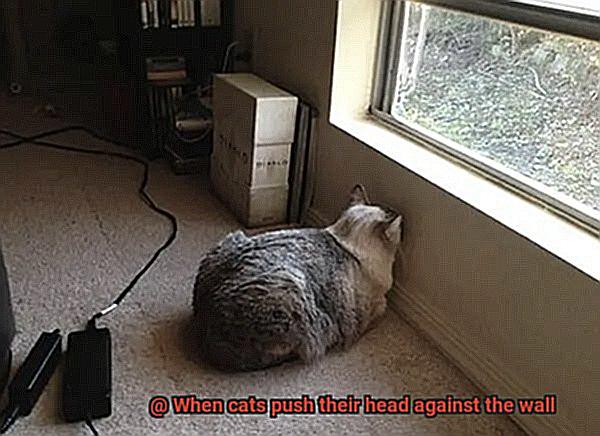
There are several reasons why your cat might be in pain or discomfort. They could have an injury, infection, dental problems, ear infections or even a neurological disorder. If you observe your cat pushing their head against the wall, pay close attention to any other unusual behavior such as lethargy, loss of appetite, or changes in mood.
It’s important to take swift action once you suspect that your cat is in pain. Take them to the vet right away for a thorough examination and tests to diagnose the underlying cause of the pain. Depending on the diagnosis, your vet may prescribe medication or recommend treatment options to alleviate your cat’s pain and discomfort.
Always keep in mind that cats are experts at masking their pain, so it’s crucial to be watchful and attentive to any changes in their demeanor or daily routine. Early intervention can make a world of difference in your kitty’s recovery and prevent further complications down the road.
Behavioral Issues
However, if you notice your cat persistently pushing their head against the wall or other objects, it may be a cause for concern. Head pressing in cats is not a normal behavior and could be an indication of underlying medical or behavioral issues.
One possible cause of head pressing in cats is discomfort or itchiness in their head or neck. This could be due to allergies, ear mites, or other medical conditions. Pay attention to any other symptoms your cat may be exhibiting, such as excessive scratching or shaking of their head.
Neurological issues can also lead to head pressing in cats. If your cat is experiencing disorientation, circling, or seizures along with head pressing, it’s important to seek veterinary care immediately. Early intervention can make all the difference in your cat’s prognosis and quality of life.
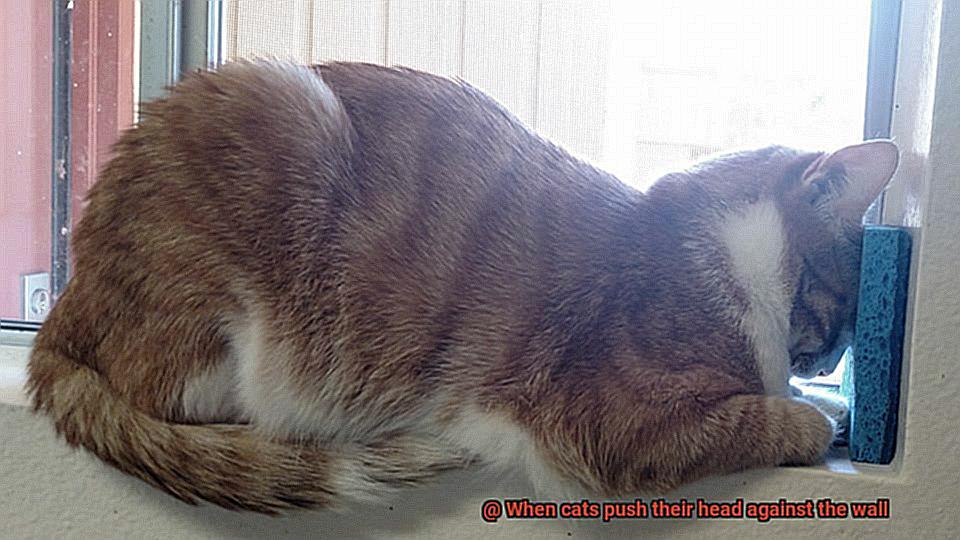
Male cats who are not neutered may engage in head pressing as a way of marking their territory. This behavior is less concerning than medical or neurological causes but should still be monitored.
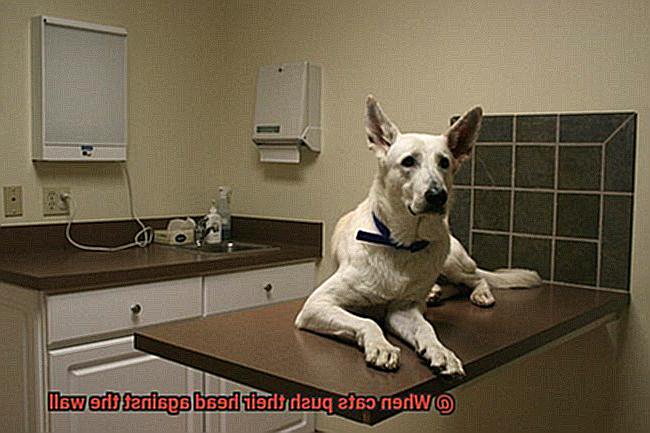
It’s essential to note that head pressing is not a behavior that should be taken lightly. If you notice your cat engaging in this behavior, consult with your veterinarian to rule out any underlying issues. Your vet will perform a thorough examination and recommend appropriate treatment based on their findings.
Diagnosis and Treatment of Head Pressing in Cats
But when you notice your cat persistently pushing their head against the wall like a stubborn bulldozer, it’s time to take action. This behavior is known as head pressing, and it could be a sign of an underlying medical or behavioral issue.
Head pressing in cats is a serious concern that requires prompt diagnosis and treatment. If left untreated, it can lead to severe neurological issues that can even be life-threatening. Therefore, it’s essential to understand the diagnosis and treatment of head pressing in cats.
To diagnose head pressing in cats, your veterinarian will perform a thorough physical examination, blood tests, and imaging studies such as MRI or CT scans. Once the diagnosis is confirmed, the treatment for head pressing in cats depends on the underlying cause. If it’s due to an infection, antibiotics will be prescribed. If it’s due to a tumor, surgical intervention may be required. In cases where the cause cannot be determined, symptomatic treatment such as pain relief may be provided.
It’s important to note that some causes of head pressing in cats cannot be cured, and treatment may only aim to manage the symptoms. In such cases, regular veterinary check-ups are necessary to monitor the cat’s condition and adjust treatment accordingly.
Aside from medical treatment, environmental modifications may also be necessary to prevent further episodes of head pressing. This may include ensuring a safe and comfortable living space for the cat, reducing stressors, and providing mental and physical stimulation through play and exercise.
Prevention of Head Pressing in Cats
That’s why it’s crucial to take action immediately if you ever notice your cat pressing their head against a wall or any other surface. Head pressing in cats can be a symptom of neurological disorders, which can be challenging to treat. However, there are some preventive measures you can take to reduce the likelihood of this behavior developing.

Regular veterinary checkups are one of the most important ways to prevent head pressing in cats. By catching any underlying medical conditions early on, your veterinarian can recommend appropriate treatments before they become more severe. Additionally, keeping your cat’s environment as stress-free as possible is essential. Stress can trigger neurological issues that lead to head pressing, so make sure your cat has plenty of safe spaces where they can relax and unwind.
Another crucial prevention measure is providing your cat with a healthy and balanced diet. Feeding them high-quality food can improve their overall health and reduce the risk of developing neurological disorders. Plus, engaging your cat with mental and physical stimulation can also help reduce their stress levels and prevent head pressing.
It’s equally vital to keep toxic substances out of reach of your cat since chemical poisoning can cause neurological issues leading to head pressing. Ensure that all chemicals and medications are safely stored away, and keep your home free from any potential hazards.
Signs and Symptoms to Look for
One such behavior is when they push their head against the wall. While it may seem endearing or peculiar, it could actually be an indication of an underlying health issue. That’s why it’s crucial to be aware of the signs and symptoms to look for, so you can identify any potential problems early on.
One of the most typical signs that your cat may be pushing their head against the wall is constant rubbing of their head or face against objects. This behavior is typically accompanied by excessive scratching around the ears or head. If you observe your cat displaying these behaviors, it’s imperative to check for any discernible signs of irritation or injury.
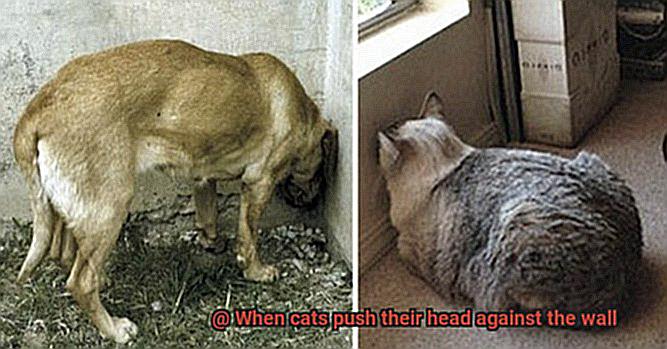
Another symptom to keep an eye out for is a change in your cat’s behavior. If they seem more lethargic or less interested in their usual activities, it could be a sign that something is amiss. Additionally, if your cat is experiencing any discomfort or pain, they may vocalize more than usual or become more irritable.
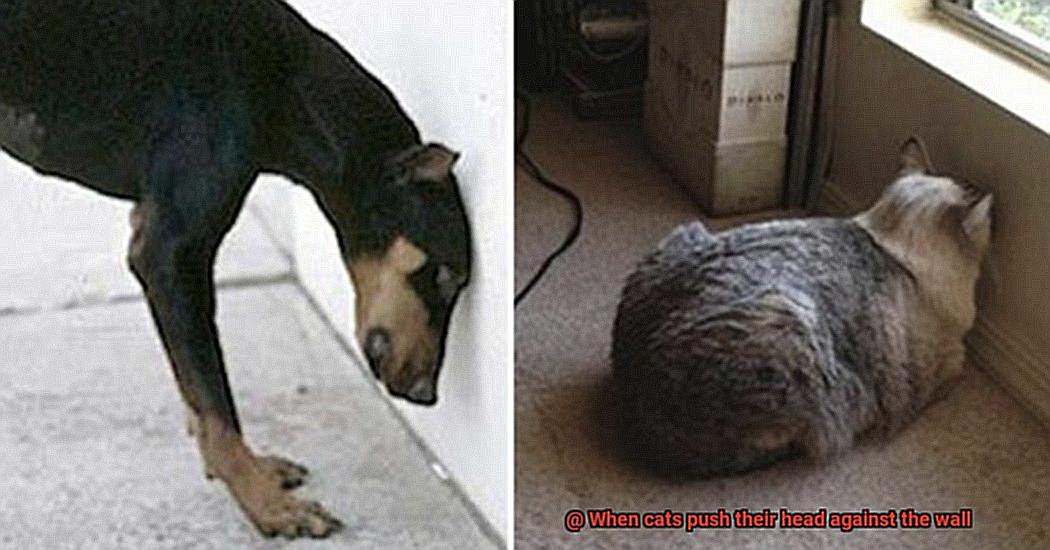
In addition, changes in appetite or thirst, vomiting, diarrhea, or any other unusual behaviors should be taken seriously. If you notice any of these symptoms in your cat, it’s crucial to schedule an appointment with your veterinarian as soon as possible.
When to See a Vet
However, if you spot your furry friend pushing their head against the wall, don’t dismiss it as mere quirkiness. This action could potentially indicate an underlying health issue, which is why it’s crucial to know when to take action and seek professional help.
There are several reasons why your cat might be pushing their head against the wall. If this behavior is accompanied by other symptoms such as loss of balance, circling, or disorientation, it could be a sign of a neurological issue. In this case, it is essential to take your cat to the vet immediately for diagnostic tests like an MRI or CT scan.
Another potential root cause could be infections, particularly ear infections. If your cat is frequently scratching at their ears or shaking their head, it’s best to schedule an appointment with your vet as soon as possible. Other symptoms may include discharge from the ears and a foul odor.
Allergic reactions can also trigger this behavior. It might be due to something your cat ingested or something in their environment. If you notice your cat pushing their head against the wall along with other symptoms like itching, swelling, or hives, it’s best to take them to the vet for an allergy test.
In some cases, pushing their head against the wall may be a behavioral problem. Suppose you suspect this is the case. In that case, it’s still important to rule out any underlying medical issues before assuming it’s purely behavioral.
F-TFTykz4WE” >
Conclusion
To sum up, when cats push their head against the wall or furniture, it could be for various reasons. They may be marking their territory, showing affection or trying to relieve stress. However, if this behavior becomes repetitive and persistent, it may indicate a medical or behavioral problem that requires immediate attention.
As pet owners, we should closely monitor our feline friends’ behavior and understand their way of communicating with us. If you notice your cat displaying unusual symptoms like head pressing or any other concerning behavior, don’t hesitate to seek veterinary care.
Early detection and treatment can significantly improve your cat’s health and well-being. Regular check-ups with your veterinarian, providing a safe and stress-free environment for them, and feeding them high-quality food are some preventive measures that can help reduce the likelihood of head pressing behavior.
It’s important to remember that cats are masters at hiding their pain and discomfort. Therefore, we need to be vigilant for any changes in their routine or behavior.







